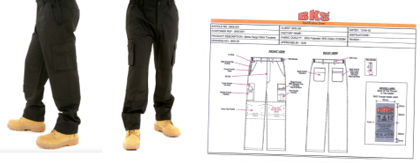The UK Intellectual Property and Enterprise Court (“IPEC”) has issued its decision in KF Global Brands Ltd v Lead Wear Ltd and others, ruling that UK unregistered design rights did not subsist in the design of the Claimant's cargo trousers.
The case concerned whether UK unregistered design right (“UKUDR”) subsisted in the Claimant's design of cargo trousers, and, if so, whether that design had been infringed by three versions of trousers made subsequently on behalf of the Defendants.
Background
In 2015, the Claimant, KF Global Brands Ltd (“KF Global”), designed a pair of BKS-001 cargo trousers (the “KF Cargo Trousers” ), shown in the image and design drawings below.
KF Global claimed that this design had been infringed by three versions of trousers made subsequently for the Defendants (collectively “Lead Wear”), two versions of which are shown in the images below (the “Lead Wear Cargo Trousers”).
Factors considered by the IPEC
A design will only qualify for UKUDR protection under s. 213 of the Copyright, Designs and Patents Act 1988 (“the Act”) if it is “original” in two distinct senses:
- First, the design must be “original” in the copyright sense, meaning that it originated with the author rather than being copied from another design;
- Second, a design is not original if it is “commonplace” in the design field in question at the time of its creation.
KF Global relied on a combination of 12 features in the KF Cargo Trousers, which it alleged made them original and therefore protected by UKUDR. Addressing both aspects of the meaning of “original”, Lead Wear argued in response that the design of the KF Cargo Trousers was in fact copied from an earlier design created by Aldi, such that it was commonplace at the time of its creation having regard to both the Aldi design and a number of items of prior art.
The court found that one of the directors of KF Global, Mr Khan, had given a sample of the Aldi trousers to a manufacturer and designer, Ali Textiles, to take back to Pakistan with a view to producing a competing product at a similar price. In addition, the directors of KF Global had sent several emails to Mr Ali referring to the Aldi trousers, two of which asked Mr Ali to make changes to the company’s products to more closely resemble the Aldi trousers, and a third which called their sample “the NAVY BLUE ALDI TROUSERS”. Giving witness evidence in court, Mr Khan tried to explain that the reference to Aldi was a “code”. The judge commented that he did not believe Mr Khan’s evidence on this point.
The court found that the design of the KF Cargo Trousers was a copy of the Aldi design with one material difference: changing pen loops to a pen pocket. The judge applied Neptune (Europe) Ltd v Devol Kitchens Ltd [2017] EWHC 2172 (Pat) and found that the difference was so minor that it did not create a new design right in the claimant's design as a whole. The claimant could have alleged that the new pen pocket element subsisted as a separate design in its own right, but did not rely on this line of argument.
The judge therefore decided that the design of the KF Cargo Trousers was not original, meaning that the claim against the Defendants failed.
KF Global argued that the Lead Wear Cargo Trousers constituted both primary and secondary infringement of its alleged rights. Although KF Global’s case was ultimately dismissed due to its failure to establish valid UKUDR, for completeness the judge also went on to consider the question of infringement in case he was wrong on subsistence.
The court found that there was no primary infringement as the Lead Wear Cargo Trousers were made by S&S Swimwear in Bangladesh, and the only potential authorisation to do anything was an authorisation to make those products in Bangladesh. On this evidence, the alleged infringing acts took place outside the United Kingdom and therefore beyond the jurisdictional scope of UKUDR protection.
KF Global’s case for secondary infringement was premised on the importation by Lead Wear of the Lead Wear Cargo Trousers into the United Kingdom for commercial purposes. On that basis, the Claimant was required to show pursuant to s. 227(1) of the Act that the Defendants knew, or had reason to believe, that the Lead Wear Cargo Trousers were infringing. However, the court held that the letter before action sent by KF Global’s solicitors was insufficiently detailed and so could not be relied upon to demonstrate that Lead Wear had satisfied the requisite threshold. Consequently, even if UKUDR had subsisted in the KF Cargo Trousers, the secondary infringement claim would have failed.
Implications of the case for designers
There was some confusion from the evidence as to what design the Claimant was relying on for the purposes of its claim; in particular, KF Global lacked design drawings from the relevant time. The Claimant presented the design drawing above as evidence of its UKUDR. However, the judge concluded ultimately that the design drawing relied upon did not accurately depict the Claimant’s trouser design as at April 2015. Instead, the judge held that the relevant design was depicted in the photographs emailed to Ali Textiles in April 2015. To guard against this type of issue, designers should keep records of all design drawings in an organised, chronological manner, with any new iterations clearly documented as the design changes during development.
Another key point from the decision that should serve as a warning to designers is the finding that the KF Cargo Trousers were insufficiently original, given the immaterial differences from the prior art. The originality criterion is generally considered to be a low bar to satisfy. However, designers should be aware that a small change to a pre-existing design is unlikely to give rise to UKUDR in the design of the whole article, although rights could subsist separately in the new feature. Consequently, where an earlier design serves as ‘inspiration’ it is important to recognise that the resultant article may not be protectable, at least under the UKUDR regime.
Co-authored by Beth Wilson, Trainee Solicitor






Social Media cookies collect information about you sharing information from our website via social media tools, or analytics to understand your browsing between social media tools or our Social Media campaigns and our own websites. We do this to optimise the mix of channels to provide you with our content. Details concerning the tools in use are in our privacy policy.